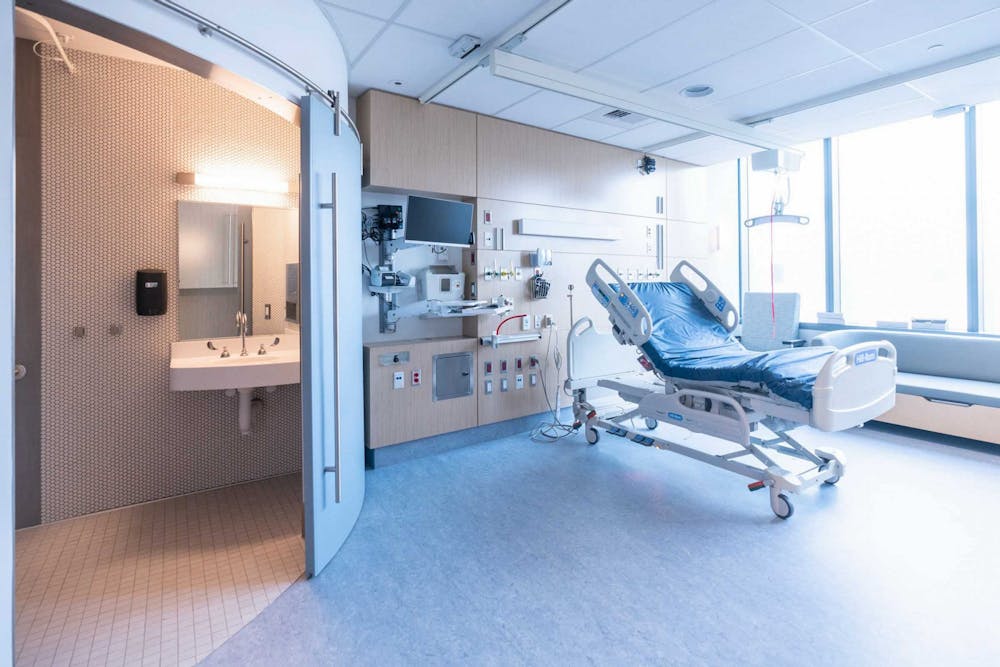According to the University’s COVID Tracker, U.Va. Health currently has 45 individuals hospitalized due to COVID-19, two of whom were admitted yesterday. Dec. 9 and Dec. 12 marked the largest number of hospitalizations U.Va. Health has seen so far, with 10 individuals admitted both days. The current seven-day moving average is 6.29 hospitalizations, whereas prior to December, the highest seven-day moving average had been roughly four hospitalizations.
This increase in hospitalizations is consistent with the rise in cases nationally — the U.S. death toll surpassed 300,000 on Monday and the country has seen more than 16 million cases of the virus. The Commonwealth of Virginia also set a weekly case record Dec. 10 with more than 26,000 cases reported within seven days. In response, Gov. Ralph Northam, D-Va., announced a statewide curfew between the hours of 12 a.m. and 5 a.m. and reduced the commonwealth’s gathering restriction from 25 to 10 individuals.
Dr. Reid Adams, chief medical officer at U.Va. Medical Center, said that he thinks this surge in hospitalizations is due to an increase in travel and indoor gatherings during Thanksgiving, despite advice offered from medical experts ahead of the holiday. Though the two-week incubation period — the time during which patients typically develop symptoms of COVID-19 — ended over the weekend, Adams said that he is unsure whether the hospital system will start to see a decrease in cases.
“Whether or not it’s the worst, I don’t think any of us know,” Adams said. “Only a little bit of time will tell whether that’s true or not.”
In an interview with The Cavalier Daily, Wendy Horton, U.Va. Medical Center chief executive officer, said that U.Va. Health is feeling “pretty comfortable” about the amount of personal protective equipment that they have available for staff, despite the increase in hospitalizations.
“We’ve really tried to bolster our PPE,” Horton said. “We’ve done some advanced buys to make sure that we have enough PPE and masks and everything from exam gloves to anything that we might need...that’s something that we monitor every day.”
Horton also said that U.Va. Health has been able to increase testing available to its staff and the public since students left Charlottesville.
Whereas previously hospital employees could only make an appointment for asymptomatic testing, the recent increase in cases led to the implementation of walk-in asymptomatic testing, although still operating on a purely voluntary basis.
There are currently two COVID-19 units in the hospital — one for patients who do not require positive pressure ventilation, and the other for those who do need the support. According to a patient care technician at the hospital who asked to remain anonymous, the COVID-19 units are all well-staffed, and there is at least another floor of empty beds that are available. During a given shift, the units are staffed with upwards of 50 people — including doctors, nurses, nurse aids, respiratory therapists, physical therapists, occupational therapists, social workers and janitorial staff.
While Adams said that so far, U.Va. Health has not had to adjust its ability to offer elective procedures significantly, some staff have been redeployed in order to accommodate the increase in COVID-19 patients. Horton said that these staffing changes are reevaluated on a day-to-day basis, as the hospital’s leadership meets daily to consider adjustments based on how many COVID-19 patients were admitted within the last 24 hours.
According to the anonymous patient care technician, these changes in hospital operations have left some staff feeling strained, and at times, overworked.
“I think people are definitely feeling the strain,” they said. “We have two new units now that are both full of people who need really intensive care, so a lot of people are having to work outside their normal areas. That’s very stressful because we go out of our way to work in the kinds of specialities that we prefer to work in, and then this situation comes along and we have to be willing to work wherever.”
Staff have been redeployed throughout the pandemic, but the situation has worsened due to the increasing number of hospitalized patients. According to the patient care technician, with the increased attention on COVID-19 units, other units in the hospital have become short-staffed.
“We’re not in any danger of running out of beds, but I don’t know how many more patients we’ve got to get before running out of staff,” they said.
Horton confirmed that currently, U.Va. Health has both enough beds and staff to accommodate the needs of both COVID-19 patients as well as other individuals seeking care, but warned that an increase in hospitalizations could change that.
“At present we have enough staff, but you can imagine if something happened to us like other parts of the country where the entire hospital was filled with COVID [patients] that staffing would be very tight,” Horton said. “We'd be in a highly undesirable situation.”
U.Va. Health received its first delivery of the Pfizer vaccine Tuesday and administered its first dose of the vaccine that afternoon. The hospital is working with the state and the Center for Disease Control and Prevention to set up a vaccination schedule. Based on preliminary information, Horton said that the hospital expects to receive vaccination shipments every two to three weeks.
In addition to continuing social distancing and mask-wearing throughout the winter, Adams encouraged University students to consider getting vaccinated when they become eligible. Students will not return to Grounds until late January and will be required to participate in pre-arrival testing and mandatory weekly testing.
“If everybody takes care of themselves, then they will take care of their families as well as others around them,” Adams said.







